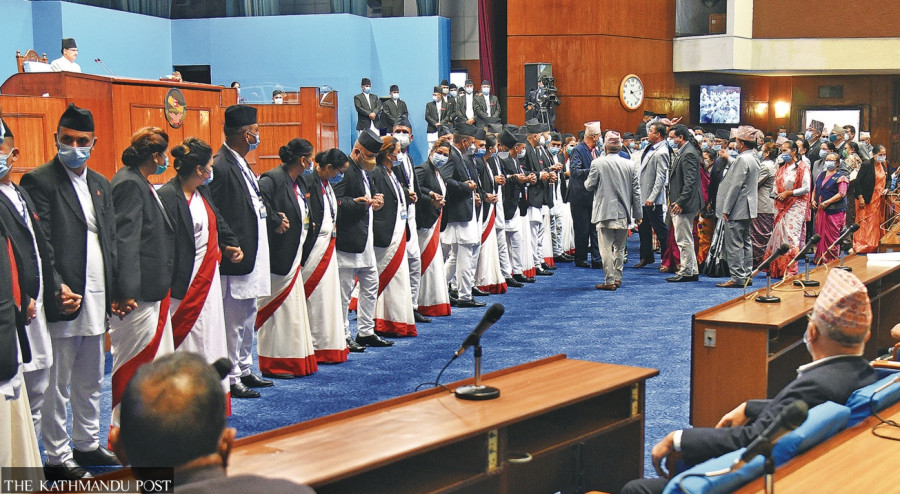Politics
Political parties are holding Parliament hostage
The government, the opposition and the Speaker are only concerned about petty party interests, a former Speaker says.
Binod Ghimire
The Constitution of Nepal makes it mandatory for the government to present ordinance(s), if there is any, at the first meeting of the new House session.
The House of Representatives Regulations explicitly say all ordinances issued when the House was not in session need to be presented at the first meeting of the new session. However, the main opposition CPN-UML resorted to obstruction when the ninth session of the federal parliament commenced on Wednesday. The meeting was adjourned twice after CPN-UML lawmakers continued chanting slogans against Speaker Agni Sapkota, who they claimed sided with the ruling parties to split the CPN-UML by refusing to sack 14 of its defector lawmakers.
The 14 lawmakers had recently defected to Madhav Nepal’s CPN (Unified Socialist).
Finally, in the third sitting of the day on Wednesday amid protests by the main opposition, the ordinance to amend the Political Parties Act, 2017, which was issued by the Sher Bahadur Deuba government on August 17, was presented by using marshals to meet the constitutional and legal obligation. Other items on the agenda included approving several ordinances issued by the previous UML government, but that did not happen due to the UML’s obstruction.
Although the next meeting of the lower house has been scheduled for Friday, the party has decided to continue the obstruction until the Speaker dismisses the 14 lawmakers.
There was a similar scene in the first meeting of the reinstated lower house on February 7. Over a dozen ordinances couldn’t be presented in the first meeting owing to protests by the then main opposition Nepali Congress, which opposed the ordinance to revise the Constitutional Council (Functions, Duties and Procedure) Act, 2017. Though the ordinance on the Constitutional Council was presented using marshals, other ordinances couldn’t be presented. As there is no clarity as to what happens if the ordinances aren’t presented at the first meeting, the Parliament Secretariat had started legal consultations to find out a solution. In the meantime, the Oli government adjourned the House and dissolved it for the second time.
“Our parties are happy to flout the constitution to serve their partisan interests,” Daman Nath Dhungana, a former Speaker and civil society leader, told the Post. “I hold the main opposition party and the Speaker equally responsible for the ongoing tussle in the House.”
Dhungana said the government, the opposition and the Speaker have important roles in making the House function effectively. However, all three parties have failed to perform their roles and they are only concerned about petty party interests, he said.
According to Dhungana, the question around impartiality of the Speaker is a serious issue. “Although Sapkota’s various moves appear unfair, it is wrong to resort to House obstruction questioning the decision of the presiding officer.”
Rule 21 of the Parliament Regulations says except when the House is discussing a proposal to scrap any decision by the House or Speaker, no decision by the House and the Speaker can be criticised. It also bars discussion on sub judice cases. The UML has filed writ petitions at the Supreme Court challenging Sapkota’s refusal to act on its recommendation to sack the defectors and the decision of the Election Commission to authenticate their signatures. The petitions are sub judice.
Experts on political and parliamentary affairs say if there are problems they need to be sorted outside the House meeting. However, no such attempts were made before the House meeting on Wednesday. Sapkota even didn’t call the Business Advisory Committee, which is the main mechanism to discuss the agenda for the House meeting and sort out problems if any. According to Gopal Nath Yogi, secretary at the House of Representatives, he is unaware of meetings aimed at bridging the differences. The officials at the Parliament Secretariat say they don’t see the House functioning normally any time soon.
The experts say Parliament is the ideal place to voice public concerns and discuss national problems apart from making the laws.
“However, it has become a hostage to conflicting interests of various political parties,” Lok Raj Baral, a former professor of political science at the Tribhuvan University, told the Post. “Its role has been limited to forming and toppling governments.”
The lower house hasn’t endorsed a single bill for a year now as successive governments have preferred ruling the country through ordinances by bypassing Parliament.
The Oli government issued 15 ordinances on different dates in its last year. After Sher Bahadur Deuba replaced him, he too seems to be following suit.
Experts on parliamentary affairs say parties must reach a compromise. Som Bahadur Thapa, a former secretary at the Parliament Secretariat, said the House cannot prove its worth if it is not allowed to function.
“I don’t think obstruction is a solution. There is no substitute for a compromise,” Thapa said. “Sooner or later the UML has to allow the House to function. The sooner it does, the better.”
However, former Speaker Dhungana believes that Deuba himself is in a tight spot due to differences among his coalition partners and does not want the current House to function effectively. “The actions of the opposition and ruling parties show the lower house will not complete its full term,” he said.




 16.12°C Kathmandu
16.12°C Kathmandu














